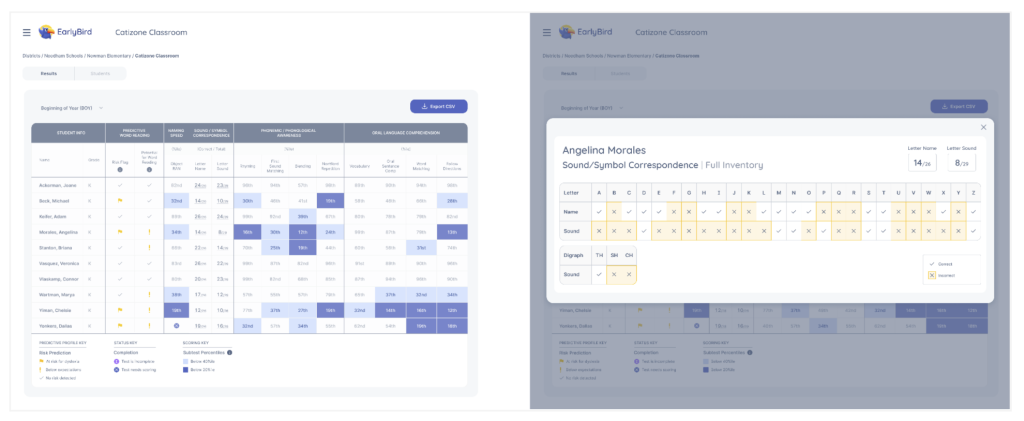As Director of Curriculum and Instruction and Assistant Superintendent at Maine School Administrative District #11 (MSAD #11), one of Angela Hardy’s many jobs is to improve literacy outcomes in the district’s schools. When she took on her role, she found that the district had a strong interest in improving literacy, but the tools for securing student data were time-consuming or provided a broad, overall score for foundational skills. The district needed something that could provide specific, actionable data on key skills, engage learners authentically, and provide the Rapid Automatic Naming component required to screen for dyslexia.

Angela knows that early detection of reading challenges is the key to successful early intervention and preventing future reading problems that can impact students’ ability to learn. That’s why she has been using EarlyBird’s dyslexia screener and comprehensive literacy assessment to pinpoint reading challenges with the district’s Pre-K, kindergarten, and first grade students. She knew she needed a tool that was vetted by research—and since EarlyBird was developed and scientifically validated at Boston Children’s Hospital, she decided to try it in her district.
MSAD #11 began using EarlyBird in 2021, and it has since become an integral component of their reading program, empowering teachers with data that helps them deliver classroom-level intervention during the optimal window for preventing reading problems.
EarlyBird: Assessment with a Purpose
The elementary schools in MSAD #11 administer EarlyBird’s game-based assessment three times a year with their Pre-K through first grade students. EarlyBird assesses a wide range of reading subskills that are most predictive of future reading issues and assigns a dyslexia risk flag to students whose reading profiles indicate possible dyslexia. This gives educators both a broad view of reading performance and the ability to drill down into each student’s specific gaps and strengths to determine how best to help them succeed at reading.
“It’s the only assessment we do that the students talk about…”
-Krysty Woodcock, First Grade Teacher
Unlike many assessments that can feel intimidating or boring to young students, EarlyBird’s game format is fun and engaging, giving students a reason to try their best and leaving them with a sense of accomplishment. “It’s the only assessment we do that the students talk about,” says first grade teacher Krysty Woodcock, referring to the enthusiastic response from the children.
As students take the auto-scoring assessment, the data appears in real time on the educators’ dashboard, giving them access to the results immediately. Once the assessments are complete, Literacy Instructional Coach Karen Collin works with teachers to identify focus areas for the whole class as well as individuals or small groups.

The educators find the data in EarlyBird to be far more robust and actionable than the data they’ve received from other assessments. They had previously used a different assessment that didn’t screen as many skills and left some reading problems unidentified until EarlyBird entered the picture.
Most importantly, EarlyBird helps the educators at MSAD #11 identify students who would otherwise go undetected—“stealth strugglers” who might mumble their way through whole-class reading exercises or students who have developed keen guessing skills to compensate for dyslexia.
“With EarlyBird, kids are engaged. By the end of the assessment, they’re feeling accomplished and actually excited to talk about their adventure with Pip! It brings the joy of learning back into assessment while giving our instructors important data.”
-Angela Hardy, Director of Curriculum and Instruction & Assistant Superintendent
Angela says she feels confident in EarlyBird because of its ability to efficiently signal discrete risk factors that determine further reading success. The students are engaged and, at the conclusion of the assessment, they feel accomplished. She appreciates that EarlyBird brings the joy of learning into an assessment where the results will also provide powerful data for instructors.
From Data to Action
For MSAD #11, the benefits of using EarlyBird don’t end when they review assessment data; in fact, that’s just the beginning. Teachers are able to adjust their classroom instruction based on their EarlyBird data in a very targeted, intentional way.
For Karen Collin, what she says she prefers about EarlyBird is that “It’s actionable.”
“I can look at the trends across each subtest with teachers, then access research-informed lesson plans and materials in the EarlyBird dashboard. Having aligned resources right there at our fingertips saves our teachers and literacy specialists a lot of time.”
– Karen Collin, Literacy Instructional Coach
In her classroom, Krysty Woodcock is able to close gaps by having students practice specific reading skills in six-week blocks. For example, if she notices in EarlyBird that many of her students are struggling with the skill of deletion, she’ll pull lessons from EarlyBird’s Next Steps Resources and focus on practicing deletion in small groups where she can get a clear picture of student progress. “It gives us more confidence in our interventions because we know we have the resources and the knowledge behind it,” she says.
Angela Hardy loves that the Next Steps Resources are evidence-based and trustworthy, so she knows the teachers can work efficiently and classroom-level instruction in her district will be sound and effective.
The Result: Improved Early Literacy Outcomes
Since implementing EarlyBird in 2021, MSAD #11 has witnessed a transformative impact on its literacy instruction and student outcomes. EarlyBird’s ability to assess a wide range of reading subskills, including Rapid Automatic Naming (RAN), has empowered educators to pinpoint reading challenges early, during the optimal window for effective intervention.
“Our system at all levels, from the classroom to the district, is now more aligned, cohesive, and focused on these high risk factors with supported, research-based integrated practice.”
– MSAD #11
The classroom-level intervention MSAD #11 is able to deliver with EarlyBird helps the district improve literacy outcomes early, during the optimal window for effective intervention. Having data for each subtest, or key foundational literacy skill, has enabled the district to refine its MTSS practices by strengthening tiered interventions and selecting aligned progress monitoring tools.
Their system at all levels, from the classroom to the district, is now more aligned, cohesive, and focused on these high risk factors with supported, research-based integrated practice. This approach has allowed the district to conserve resources for students who require more intensive intervention, and, therefore, reduce the number of referrals for special education services.
“…End of Year Data shows significant growth for most of these students.”
– Karen Collin, Literacy Instructional Coach
And for the first grade students in the district who received intervention plans based on their EarlyBird assessment results, Karen Collins shares great news: “After completing 6-8 weeks of intervention using some of the instructional routines and progress monitoring tools in EarlyBird, the End of Year Data shows significant growth for most of these students.”
Conclusion
MSAD #11’s experience with EarlyBird serves as a testament to the power of data-driven intervention in improving literacy outcomes. By providing actionable data, evidence-based resources, and a comprehensive assessment of reading skills, EarlyBird has empowered MSAD #11 to transform its literacy instruction and set its students on a path to success.
For Angela Hardy, early detection and intervention means reading outcomes will improve across grade levels as these young students enter later grades with a solid foundation in literacy. With EarlyBird, today’s struggling readers will become tomorrow’s successful learners in MSAD #11.
EarlyBird is here to help.
EarlyBird can help your district detect reading challenges early.
If your district could benefit from actionable literacy data and evidence-based resources for reading instruction, we would love to help.
Learn more about EarlyBird for schools and districts.
